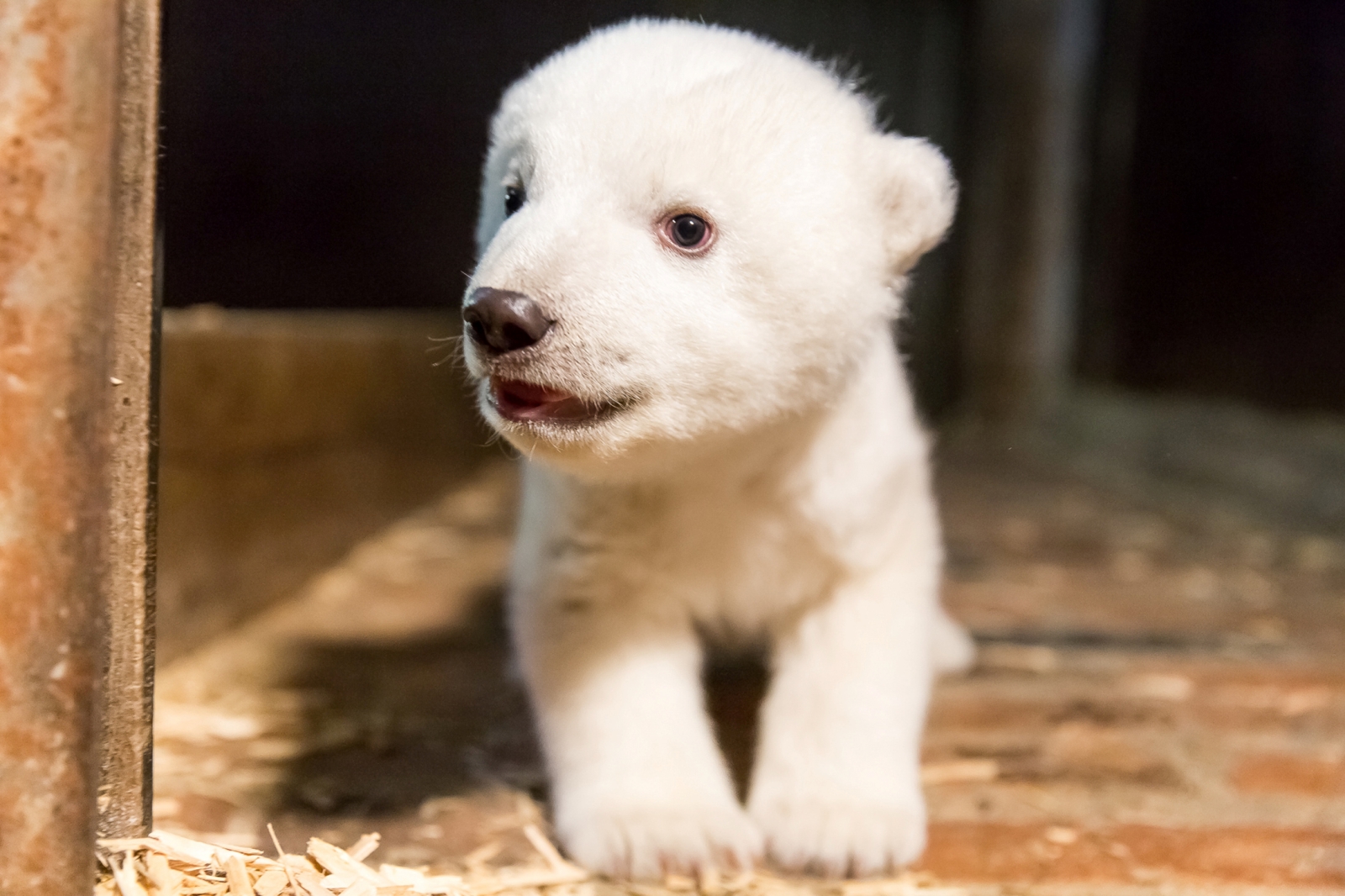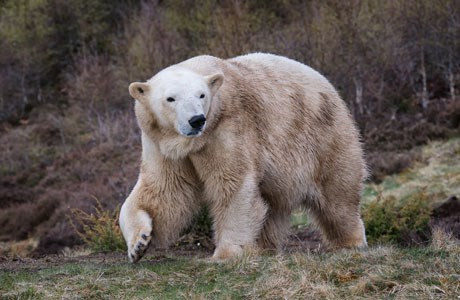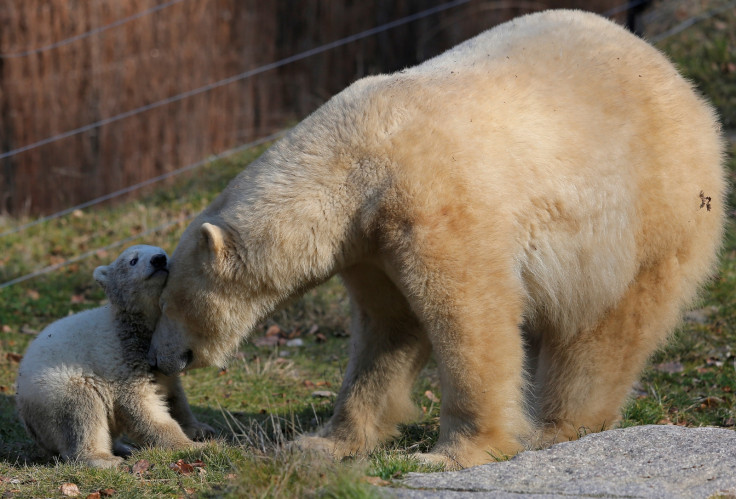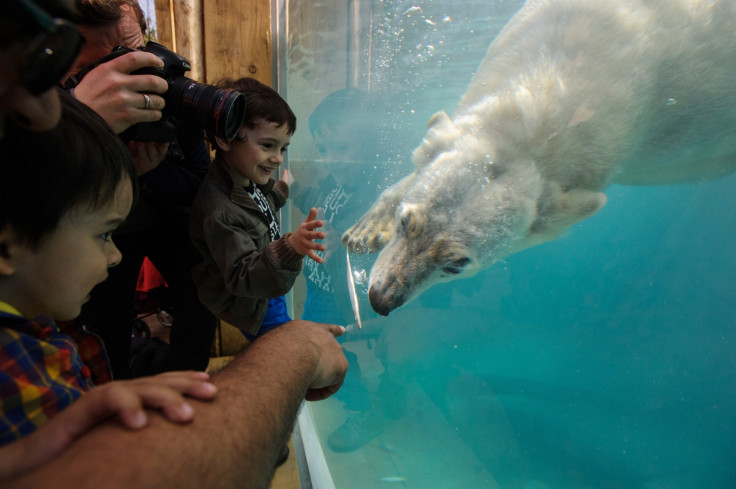UK's first polar bear birth in 25 years is a 'tragedy in the making'
KEY POINTS
- Polar bear cubs have an extremely high mortality rate in their first weeks of life.
- Two cubs died at a Berlin zoo in the past 10 months.
The Royal Zoological Society of Scotland (RZSS) is celebrating the UK's first polar bear birth in 25 years, but fears have been raised over cubs' high mortality rate in captivity.
Two polar bear cubs have died at one Berlin zoo in the past year alone, one just days ago, and charities have warned the latest birth is just a "tragedy in the making".
Victoria, the UK's only female polar bear, gave birth at the RZSS's Highland Wildlife Park over Christmas and New Year but keepers are not becoming complacent yet.
On Wednesday morning (3 January) Una Richardson, the park's head keeper responsible for carnivores, said: "While we are absolutely thrilled, we are not celebrating prematurely as polar bear cubs have a high mortality rate in the first weeks of life due to their undeveloped immune system and the mother's exaggerated need for privacy, with any disturbance risking the cub being killed or abandoned.
"We will continue to monitor Victoria and very much hope for the best possible news when she emerges around March. Until then, Victoria's enclosure will be closed to the public and keeper activity will be at a minimum to give her offspring every chance of survival."
Tierpark Berlin announced the death of its 26-day-old cub just one day earlier, when they found its lifeless body. The zoo reported the cub had been feeding as usual from its mother, eight-year-old Tonja, on New Year's Day.
The zoo's polar bear curator Dr Florian Sicks said: "We were all aware of the high mortality rate for polar bear cubs in the first few weeks, but this is still tragic news and we are deeply saddened. We will now analyse the footage from the surveillance camera and wait for the autopsy results."
Just months earlier in March Tonja had given birth to another cub, Fritz, which also died. Fritz was found lying listlessly in his den and was moved to the neighbouring Leibniz Institute for Zoo and Wildlife Research for examination, where the only abnormal result was a worrying liver reading. He was given antibiotics and painkillers but, soon afterwards, he died from liver damage leading to multiple organ failure, aged just four months old.


Months before that, the Ranua Zoo in Finnish Lapland saw a litter of two cubs born to mother Venus in November 2016, but one died after just 10 days. Venus continued to care for the infant after its death, until suddenly she ate it. The surviving cub was only the second polar bear born at the Ranua Zoo to live for long.
Another high-profile case took place at Nuremberg Zoo in Germany in January 2008, when keepers decided not to intervene as polar bear mother Vilma stopped feeding her five-week-old cubs. It appeared that Vilma either decided to kill the cubs because they were sick or simply saw them die, but it was likely she ate them as keepers could not find their remains.
Born Free Foundation has long maintained that polar bears are "profoundly ill-suited to the zoo environment" due to widespread display of stereotypic abnormal behaviours, infanticide and high rates of cub mortality. Strange behaviours can include continually shaking their heads, pacing up and down, or swimming in a stereotypical fashion such as in figures of eight.

Will Travers, president of Born Free, said the charity sees the Highland Wildlife Park's new arrival as more of a "tragedy in the making". He told IBTimes UK: "At a time when the zoo community should be phasing out the keeping of polar bears in captivity, the Royal Zoological Society of Scotland has decided to row against the tide.
"From a welfare point of view, the enclosure at the Highland Wildlife Park may be significantly better than the blue-rinse concrete pits that people so often associate with polar bears in zoos, but we contend that our efforts on behalf of this species should be focussed on mitigating the impacts of human-induced climate change and securing the species in the wild, not subjecting another polar bear to a life time in captivity."
Doug Richardson, head of Living Collections at the Highland Wildlife Park, had said that their approach to care and husbandry mirrors "what would happen in the wild." But Travers responded: "The wild is a place this cub will never see or know, and how depressing that we still believe that we should have 'living collections.'"
He added: "Born Free and our many supporters around the world sadly cannot celebrate events at the Highland Wildlife Park. It is not the start to 2018 that we would hope for."

Elisa Allen, director of PETA, also condemned keeping polar bears in captivity. She told IBTimes UK: "Animals are not meant to live in cages, least of all polar bears, who – in the Arctic, where they belong – roam thousands of miles, search for food, and defend their territory.
"Researchers at the University of Oxford cited the species as one that does especially poorly in captivity – hardly surprising given that the average enclosure for a polar bear is 1 million times smaller than the natural range of one in the wild.
"No captive-born polar bear has ever been introduced into the wild – and all the millions of pounds that are spent on breeding and housing these animals could instead be directed towards fighting climate change, which is quite literally melting their habitats. After all, what's the point in saving a species if it has no home left to live in?"
Bear Conservation says that no facility which houses polar bears can give them sufficient space to live anything approaching a natural life. The charity has particularly criticised polar bear breeding programmes, saying: "Many of the cubs born in captivity die within a few years, or even months, of birth. Breeding polar bears in zoos can never 'save the bears' from extinction, or repopulate the wild. No captive-born polar bear has ever been successfully released into the wild."

Yet speaking about the polar bear conservation ambitions at RZSS, chief executive Barbara Smith said: "We believe we have a duty to help protect this magnificent species, with the reduction in sea ice, the polar bear's primary seal hunting platform, predicted to significantly reduce numbers over the next 40 years.
"Our polar bears are part of the European Endangered Species Programme and we hope Victoria's offspring will survive to reinforce the captive population, which may be needed in the future to augment and help restore a markedly reduced and fragmented wild population."






















